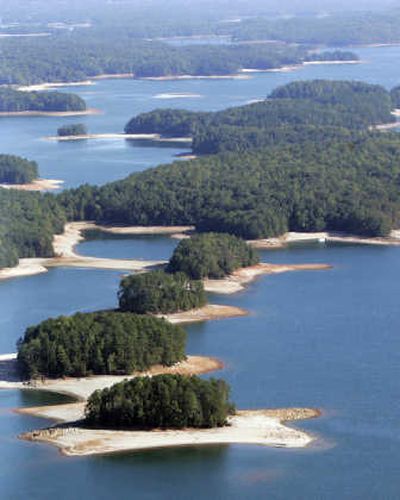Southeast drought worsens

CUMMING, Ga. – With water supplies rapidly shrinking during a drought of historic proportions, Gov. Sonny Perdue declared a state of emergency Saturday for the northern third of Georgia and asked President Bush to declare it a major disaster area.
Georgia officials warn that Lake Lanier, a 38,000-acre reservoir that supplies more than 3 million people with water, is less than three months from depletion. Smaller reservoirs are dropping even lower.
Perdue asked the president to exempt Georgia from complying with federal regulations that dictate the amount of water released from Georgia’s reservoirs to protect mussel species downstream.
“We need to cut through the tangle of unnecessary bureaucracy to manage our resources prudently so that in the long term all species may have access to life-sustaining water,” he said.
On Friday, Perdue’s office asked a federal judge to force the Army Corps of Engineers to curb the amount of water it drains from Georgia reservoirs into streams in Alabama and Florida. Georgia’s environmental protection director is drafting proposals for more water restrictions.
More than a billion gallons of water is released from Lanier every day. The Corps of Engineers bases its water releases on two requirements: The minimum flow needed for a coal-fired power plant in Florida and mandates to protect two mussel species in a Florida river.
White House press secretary Dana Perino said Perdue’s request will be reviewed.
“In the meantime, we have already begun drafting interim rules to use procedures and flexibility to address the endangered species requirements and the Army Corps has started the process of revising the operations manual for the river basin,” Perino said.
Georgia lawmakers say neighboring states also are exploiting the law as a tool to draw more water from Georgia’s lakes.
“We’ve learned from this what a blunt weapon the Endangered Species Act has become,” said state Rep. John Linder. “We need to understand this lake was created not for mussels but for people.”
More than a quarter of the Southeast is covered by an “exceptional” drought – the National Weather Service’s worst drought category. The Atlanta area, with a population of 5 million, is smack in the middle of the affected region, which encompasses most of Tennessee, Alabama and the northern half of Georgia, as well as parts of North and South Carolina, Kentucky and Virginia.
Georgia was placed under statewide water restrictions in April that limited outdoor watering to three days a week. By May, Atlanta allowed watering only on weekends. In September, environmental officials banned virtually all outdoor watering through the northern half of the state.